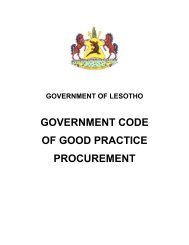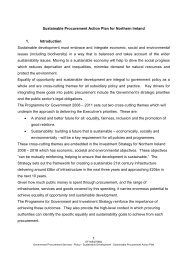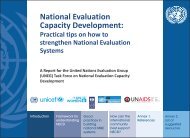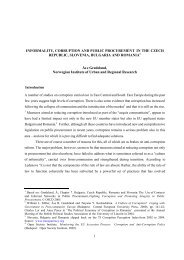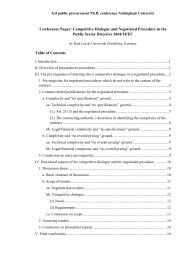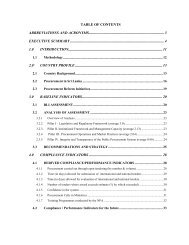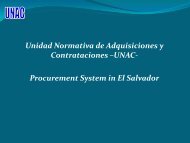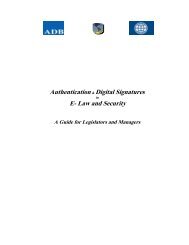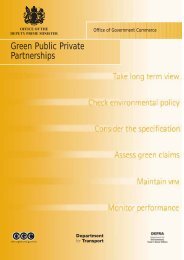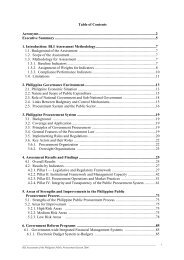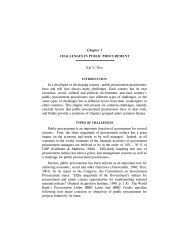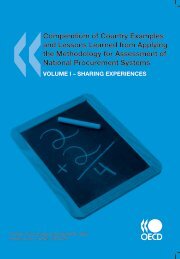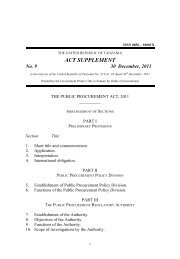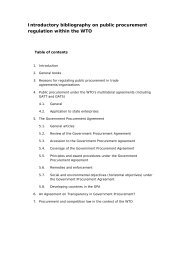The Public Procurement Rules 2008 - LGED
The Public Procurement Rules 2008 - LGED
The Public Procurement Rules 2008 - LGED
You also want an ePaper? Increase the reach of your titles
YUMPU automatically turns print PDFs into web optimized ePapers that Google loves.
PART – 3<br />
NATIONAL PROCUREMENT: TWO-STAGE TENDERING METHOD<br />
65. Conditions and Procedures for Use of Two-Stage Tendering Method. - (1) A<br />
Procuring Entity may use this Method in the case turnkey Contracts or contracts for large complex<br />
facilities, such as the supply, installation and commissioning of processing plants, or works of<br />
complex nature or communication technology etc.<br />
(2) <strong>The</strong> use of the word ‘complex’ in describing the nature of the items to be procured<br />
under Two-Stage Tendering Method covers <strong>Procurement</strong> requirements for which it may not be in<br />
the best interests of the Procuring Entity to prepare complete technical specifications in advance<br />
because of rapidly changing technology, and also <strong>Procurement</strong> requirements for which the<br />
Procuring Entity lacks the capability to prepare a full technical specification because alternative<br />
technical approaches may be available, but not within the knowledge of the Procuring Entity.<br />
66. Procedures for the Two-Stage Tendering Method. |— (1) In the First-Stage, a<br />
Procuring Entity shall invite unpriced Technical proposals through advertisement on the basis of a<br />
conceptual design that provides potential Tenderers with basic technical information, such as<br />
conditions relating to expected production capacity of works, , outline of the technical<br />
specifications and visual, operational and economic details of the object of the <strong>Procurement</strong>.<br />
(2) <strong>The</strong> advertisement under sub-Rule (1) shall state the criteria that shall be used to<br />
determine responsiveness of a Technical Proposal in which , the following issues shall also be<br />
included –<br />
(a) the relative managerial and technical competence of the Tenderer; and<br />
(b) the effectiveness and future adaptability of the Technical Proposals submitted<br />
by the Tenderer in meeting the <strong>Procurement</strong> requirements of the concerned<br />
Procuring Entity.<br />
(3) <strong>The</strong>re shall be no requirement of submitting a Tender Security by the Tenderers in<br />
the First-Stage.<br />
(4) In response to the invitation for Technical Proposal , Tenderers shall submit its<br />
Technical Proposals describing the technical performance, quality and other characteristics of the<br />
Goods and related Services and Works and physical Services which they consider best suited to<br />
meet the Procuring Entity’s needs and shall comment upon the terms and conditions suitable for<br />
managing contract performance.<br />
(5) <strong>The</strong> time allowed for the submission of Technical Proposals shall be as specified in<br />
Schedule II.<br />
67. Evaluation of the First Stage in the Two-Stage Tendering Method. |— (1) <strong>The</strong><br />
Evaluation Committee shall evaluate all Technical Proposals received and in view of the complex<br />
nature of this kind of <strong>Procurement</strong> under Rule 65, it may, with the approval of the Head of a<br />
Procuring Entity or an officer authorised by him or her or an Approving Authority, seek the<br />
assistance of a Technical Sub-Committee, or external technical experts from the beneficiary entity<br />
or others with specific knowledge of the concerned object of <strong>Procurement</strong>.<br />
(2) <strong>The</strong> Evaluation Committee shall review the Technical Proposals in order to identify<br />
those Proposals that are responsive in compliance of the terms and conditions specified in the<br />
Tender Documents, but the Proposals that are not found to be responsive shall receive no further<br />
58



